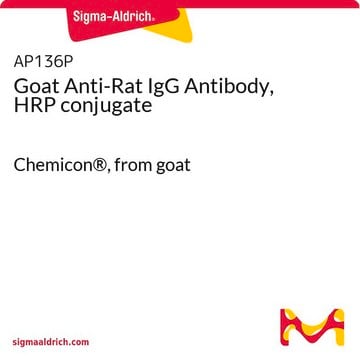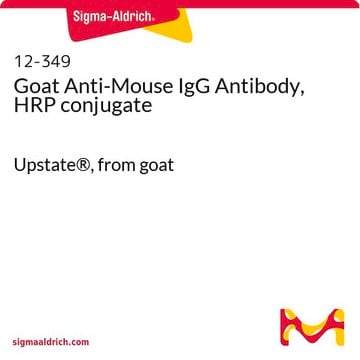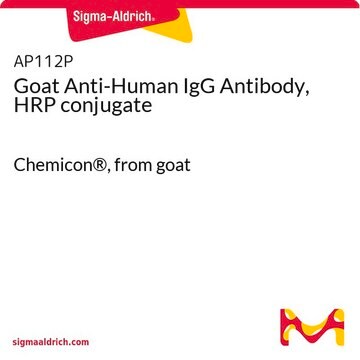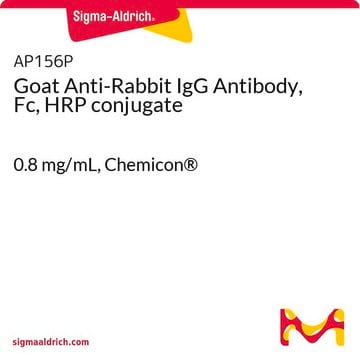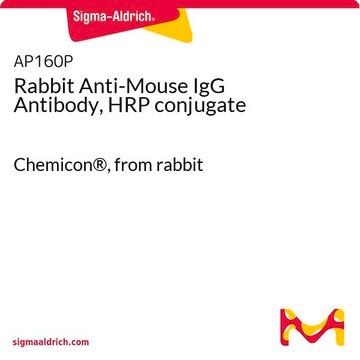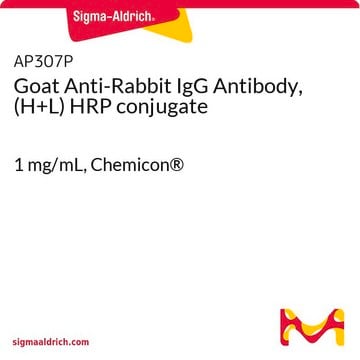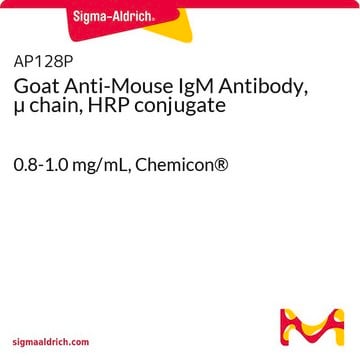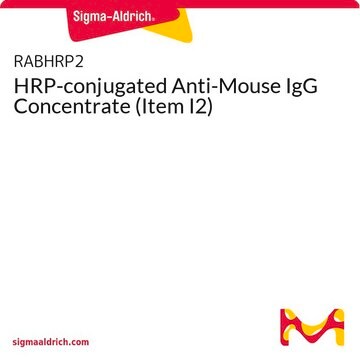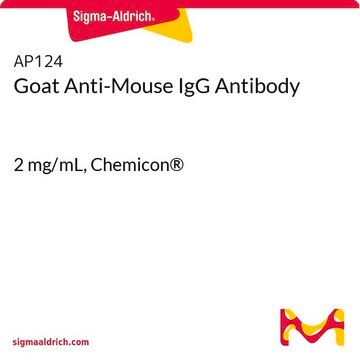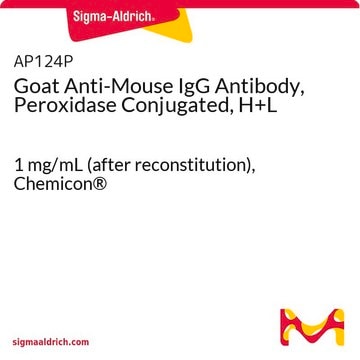AP127P
Goat Anti-Mouse IgG Antibody, Fc, HRP conjugate
0.8 mg/mL, Chemicon®
Synonym(s):
Anti-mouse HRP antibody
Sign Into View Organizational & Contract Pricing
All Photos(1)
About This Item
UNSPSC Code:
12352203
eCl@ss:
32160702
NACRES:
NA.46
Recommended Products
biological source
goat
Quality Level
conjugate
peroxidase conjugate
antibody product type
secondary antibodies
clone
polyclonal
species reactivity
mouse
manufacturer/tradename
Chemicon®
concentration
0.8 mg/mL
technique(s)
ELISA: suitable
western blot: suitable
shipped in
wet ice
target post-translational modification
unmodified
Application
Detect Mouse IgG using this Goat anti-Mouse IgG Antibody, Fc, HRP conjugate validated for use in ELISA & WB.
Physical form
Lyophilized. Buffer = 0.01 M Sodium Phosphate, 0.25 M NaCl, pH 7.6 with 15 mg/mL BSA. Contains no preservative. Reconstitute with sterile distilled water to match the volume indicated on the vial label. Centrifuge product if it is not completely clear after standing for 1-2 hours at room temperature.
Storage and Stability
Store at +2-8°C in undiluted aliquots for up to six months.
Legal Information
CHEMICON is a registered trademark of Merck KGaA, Darmstadt, Germany
Not finding the right product?
Try our Product Selector Tool.
Storage Class Code
11 - Combustible Solids
WGK
WGK 3
Certificates of Analysis (COA)
Search for Certificates of Analysis (COA) by entering the products Lot/Batch Number. Lot and Batch Numbers can be found on a product’s label following the words ‘Lot’ or ‘Batch’.
Already Own This Product?
Find documentation for the products that you have recently purchased in the Document Library.
Customers Also Viewed
Isabelle Rose Leo et al.
Nature communications, 13(1), 1691-1691 (2022-04-01)
Acute lymphoblastic leukemia (ALL) is the most common childhood cancer. Although standard-of-care chemotherapeutics are sufficient for most ALL cases, there are subsets of patients with poor response who relapse in disease. The biology underlying differences between subtypes and their response
Isabel Barón-Mendoza et al.
Frontiers in cellular neuroscience, 15, 726501-726501 (2021-10-08)
Autism spectrum disorder (ASD) has a broad range of neurobiological characteristics, including alterations in dendritic spines, where approximately 90% of excitatory synapses occur. Therefore, changes in their number or morphology would be related to atypical brain communication. The C58/J inbred
Esther van Andel et al.
ACS applied materials & interfaces, 14(20), 23102-23116 (2022-05-11)
A common method to study protein complexes is immunoprecipitation (IP), followed by mass spectrometry (thus labeled: IP-MS). IP-MS has been shown to be a powerful tool to identify protein-protein interactions. It is, however, often challenging to discriminate true protein interactors
Bo-Ram Lee et al.
Advanced science (Weinheim, Baden-Wurttemberg, Germany), 5(8), 1800494-1800494 (2018-08-22)
Although protein nanoparticles (PNPs) (e.g., viral capsids) capable of delivering a broad range of drug agents have shown distinctive advantages over synthetic nanomaterials, PNPs have an intrinsic drawback that hampers their clinical application, that is, potential immunogenicity. Here, a novel
Yun-Xiang Cao et al.
Medical science monitor : international medical journal of experimental and clinical research, 25, 6767-6774 (2019-09-10)
BACKGROUND Rheumatoid arthritis (RA) is a chronic autoimmune disease targeting joints. This research aimed to explore the effects of Xinfeng capsules (XFC) on cardiac injury in adjuvant arthritis (AA) model rats and assessed the associated mechanism. MATERIAL AND METHODS An
Our team of scientists has experience in all areas of research including Life Science, Material Science, Chemical Synthesis, Chromatography, Analytical and many others.
Contact Technical Service